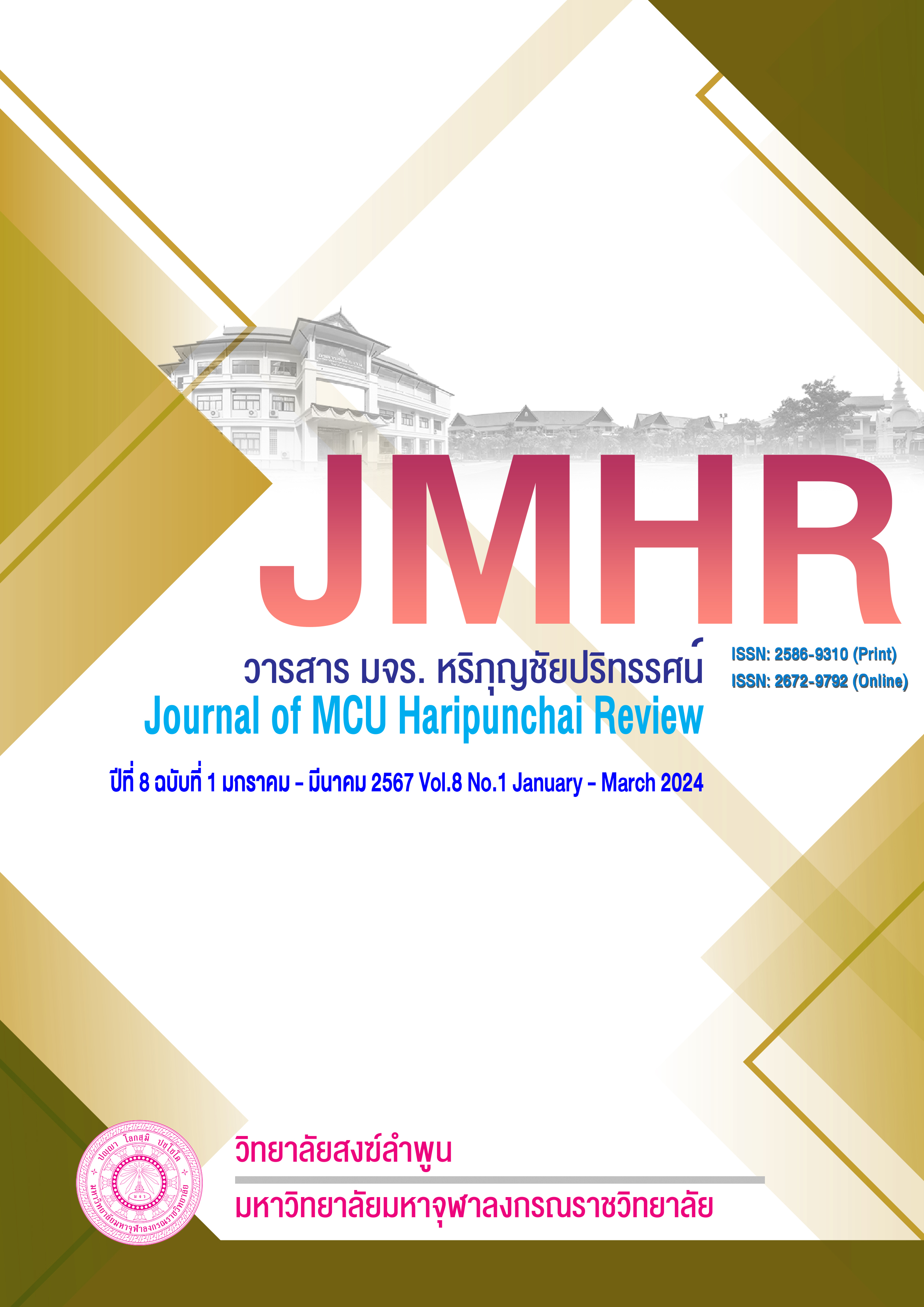People's Expectations of The Role of Politicians in Development Mae Sai Subdistrict Administrative Organization Mueang Phayao District, Phayao Province
Main Article Content
Abstract
Abstract
The Objectives of this research were 1.) To study the level of expectations of the people for the development of the Mae Sai Subdistrict administrative organization in Mueang Phayao District, Phayao Province. 2.) To compare the expectations of the people and the politicians in the development of the Mae Sai Subdistrict administrative organization, Mueang Phayao District, Phayao Province, classified according to personal factors. 3.) To present guidelines for the development of politicians in the development of the Mae Sai Subdistrict administrative organization, Mueang Phayao District, Phayao Province, which are consistent with the expectations of the people in accordance with the Sanghawatthu 4 principles.
This research is merged. Consisting of quantitative research and qualitative research methods Use a total of 4,187 people and in-depth interviews with 11 important people. The tools used are questionnaires and interviews.
The Research findings were as follows :
1. The level of expectations of the people for the development of the Mae Sai Subdistrict administrative organization, Mueang Phayao District, Phayao Province Overall, including 5 sides, at a high level (= 3.71, S.D. = 1.13)
2. The results of the comparison of the expectations of the people and the politicians in the development of the Mae Sai Subdistrict administrative organization in Mueang Phayao District, Phayao Province, found that gender, age, education level, career, and income are different. Therefore, according to the assumptions set, all five factors
3. Guidelines for the development of politicians in the development of the Mae Sai Subdistrict Administrative Organization, Mueang Phayao District, Phayao Province, which are consistent with the expectations of the people According to the principles of Sanghawatthu 4, it was found that 1.) Dana, organize a career project to improve the quality of life for the people. In order to bring knowledge to develop the community, promote, support, and conserve local wisdom for the community, by encouraging youth to learn to inherit local knowledge, cultivate good things for youth, and promote scholarships. Learning equipment 2.) Piyavaca, there should be public relations to educate. 3.) Attacariya, politicians should provide full service. Providing willingly while also behaving for the benefit of the people help to full capacity by solving the problem of infrastructure, developing quality by placing water supply systems, checking the electrical system, and repairing damaged roads. Volunteer groups should be established with government agencies and the public to participate in the development of tourist attractions or important places in the community. The help of the people and do not expect any benefits. 4.) Samanattata, politicians have behavior suitable for the position. Able to allocate budgets thoroughly, clearly, and consistently, laying yourself to suit their position. Allocate budgets thoroughly without discrimination. Promote and support activities that bring respect to the National Institute. Religion and King solve drug problems in the community by training to give knowledge and punishment for drugs. Create unity in the community. By focusing on mental development mainly and not seeing more personal benefits than the common good.
Keywords: expectations, roles of politicians, Sangahawatthu 4
Article Details

This work is licensed under a Creative Commons Attribution-NonCommercial-NoDerivatives 4.0 International License.
References
เกศสุดา โภคานิตย์. “บทบาทผู้นำในการพัฒนาท้องถิ่น กรณีศึกษานายกองค์การบริหารส่วนตำบล นาเสียว อำเภอเมือง จังหวัดชัยภูมิ”. วารสารสันติศึกษาปริทรรศน์ มจร. 5(1), 15-27.
นพจอม งามมีศรี. (2566). “ความคาดหวังของประชาชนที่มีต่อบทบาทของนักการเมืองท้องถิ่นอำเภอคลองหาด จังหวัดสระแก้ว”. วิทยานิพนธ์รัฐศาสตรมหาบัณฑิต. คณะรัฐศาสตร์และนิติศาสตร์ : มหาวิทยาลัยบูรพา.
บรรเทา ไชยโคตร. (2559). “ความพึงพอใจของประชาชนที่มีต่อการให้บริการสาธารณะขององค์การบริหารส่วนตำบลกมลาไสย อำเภอกมลาไสย จังหวัดกาฬสินธุ์”. วิทยานิพนธ์รัฐศาสตรมหาบัณฑิต. บัณฑิตวิทยาลัย : มหาวิทยาลัยมหาจุฬาลงกรณราชวิทยาลัย.
พระราชบัญญัติ. สภาตำบลและองค์การบริหารส่วนตำบล พ.ศ. 2537 (และที่แก้ไขเพิ่มเติมฉบับที่ 7 พ.ศ. 2562).
________. (2542). แผนการกระจายอำนาจให้แก่องค์กรปกครองส่วนท้องถิ่น.
________. (2542). กำหนดแผนและขั้นตอนการกระจายอำนาจให้แก่องค์กรปกครองส่วนท้องถิ่น พ.ศ., หมวด 2 การกำหนดอำนาจและหน้าที่ในการจัดระบบการบริการสาธารณะ.
พระศกลวัธน์ จิตฺตปญฺโญ (วงวิวงษ์). (2563). “บทบาทของนักการเมืองท้องถิ่นในการพัฒนาเทศบาลตำบลนาหนาดอำเภอธาตุพนม จังหวัดนครพนม”. สารนิพนธ์รัฐศาสตรมหาบัณฑิต. (บัณฑิตวิทยาลัย : มหาวิทยาลัยมหาจุฬาลงกรณราชวิทยาลัย.
ไพบูลย์ โพธิ์สุวรรณ. (2550). ข้อมูลกับการวางแผนพัฒนาท้องถิ่น. นนทบุรี : สถาบันพระปกเกล้า.
ภัทราวดี อ่ำคูณ และคณะ. (2564). “แนวทางพัฒนาจัดทำแผนพัฒนาท้องถิ่นองค์กรปกครองส่วนท้องถิ่น”. วารสารร้อยแก่นสาร. 6 (10).
ราชบัณฑิตยสถาน. (2556). พจนานุกรม ฉบับราชบัณฑิตยสถาน พ.ศ. 2554. กรุงเทพมหานคร : นามมีบุ๊ค พับลิเคชั่นส์.
รัฐธรรมนูญแห่งราชอาณาจักรไทย. (2560). ราชกิจจานุเบกษา, เล่ม 134 ตอนที่ 40 ก.
โรจนินทร์ ศรีปองพันธ์. “บทบาทของนักการเมืองท้องถิ่นในการบริหารจัดการในเขตเทศบาลเมืองสุรินทร์ จังหวัดสุรินทร์”. วารสารธุรกิจปริทัศน์. 10(2), 39-40.
วุฒิสาร ตันไชย. (2557). การกระจายอำนาจและประชาธิปไตยในประเทศไทย. กรุงเทพมหานคร : สถาบันพระปกเกล้า.
องค์การบริหารส่วนตำบลแม่ใส. (2560). ข้อมูลประชากรฝ่ายทะเบียนราษฎร์. [ออนไลน์]. แหล่งที่มา :http://maesaisao.go.th/prachakorn.php [26 ตุลาคม 2564].
Yamane t. (1973). Statistic: An Introductory Analysis, 3 rd ed. Time Printers Sdn. Bnd. Singapore.


